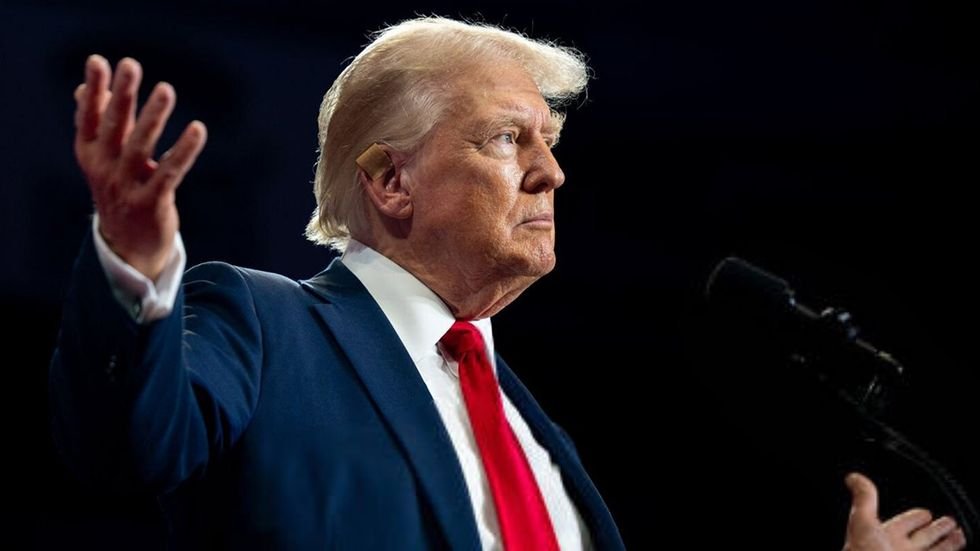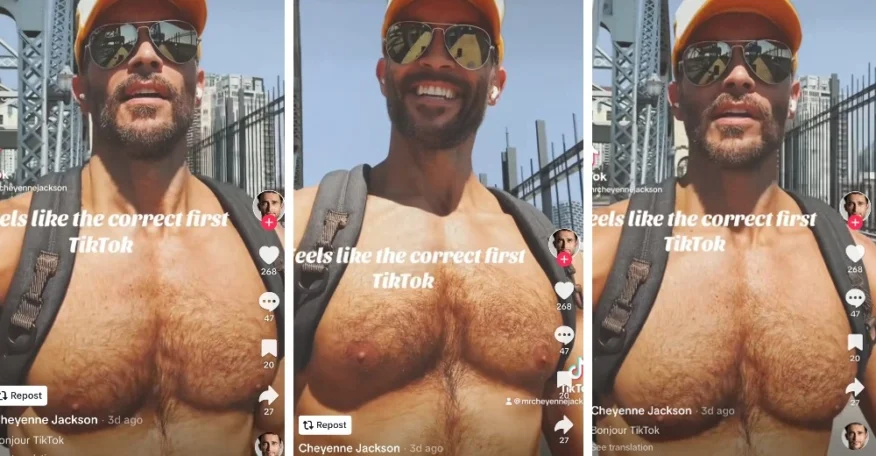Former President Donald Trump’s 2024 campaign continues to paint a dark vision of America and has found another marginalized group to target. His attacks on transgender rights have emerged as a central focus of his electoral strategy in the final push to Election Day on November 5.
Over the past several weeks, Trump and his allies have aired ads across important battleground states, pushing misinformation and false claims about gender-affirming care, transgender athletes, and public accommodations for trans people, all while framing Vice President Kamala Harris and the Biden-Harris administration as champions of “extreme” transgender policies. The ads have been airing heavily during college sports games.
One of the most prominent new ads features Black radio host Charlamagne tha God, who criticizes Harris for her support of gender-affirming care for incarcerated individuals during a discussion about the effectiveness of a Trump ad attacking the vice president in September. The ad includes a clip of Harris, spliced from a 2019 interview, where she discusses access to medically necessary gender-affirming surgery for transgender inmates. Charlamagne responds to the clip, saying, “Hell no. I don’t want my taxpayer dollars going to that.” The ad concludes with a narrator warning that Harris supports “biological men competing against our girls in sports” and says, “Kamala is for they/them. President Trump is for you.” On Monday, Trump posted the ad to X (formerly Twitter) with the comment, “COMING TO A TV NEAR YOU…”
These ads are just one part of Trump’s larger effort to use transgender issues as a political wedge. Since August, Republicans have spent more than $65 million on television ads othering the trans community, according to a New York Times analysis.
Republican pundit Scott Jennings, during a Sunday appearance on CNN’s State of the Union, explained why conservatives are focusing so heavily on these issues. “A lot of men think Democrats care more about dudes who want to become women than dudes who just want to be dudes,” Jennings said.
By framing Democrats as prioritizing transgender rights over traditional concerns of working-class men, Republicans are hoping to galvanize their base while also drawing support from swing voters.
In another ad posted to Trump’s social media platform, Truth Social, a dramatization unfolds between a fictional Harris-Walz supporter and a homeowner. The ad shows the supporter placing a Harris-Walz campaign sign in the homeowner’s yard, leading to an angry confrontation. The homeowner, visibly upset, expresses frustration over transgender-inclusive policies, focusing specifically on the idea of tampons being placed in men’s bathrooms. When asked by the Harris-Walz supporter why she doesn’t support such policies, the homeowner angrily retorts, “Because tampons are for women. Where are they going to stick it? Up their ass?”
The confrontation escalates into a heated exchange over pronouns and gender identity. When the Harris-Walz supporter accuses the homeowner of not addressing them by their pronouns, the homeowner dismissively responds with an expletive-laden insult, ridiculing the idea of gender inclusivity. The homeowner’s companion then joins in, mocking the Harris-Walz supporter by misgendering them and derisively asking, “What are you? He, she, f***ing transgender?” The supporter responds mockingly, identifying as Two-Spirit, which is also met with disdain.
Jami Taylor, a professor at the University of Toledo in Ohio who specializes in transgender policy, sees Trump’s anti-transgender messaging as a calculated attempt to energize conservative voters who are resistant to changes in gender norms. In an interview with The Advocate, Taylor said, “You don’t attack popular things; you attack unpopular things. Right now, trans people are relatively unpopular, particularly with groups that lean GOP.” Taylor, who is trans, added that the confusion surrounding nonbinary identities further complicates the public’s understanding of transgender issues, making them a ripe target for political exploitation. “The addition of nonbinary to the older trans messaging has confused some people,” she explained, emphasizing that Trump’s recent ad mocking gender-neutral pronouns has been particularly effective with conservative voters.
Taylor emphasized the importance of “meeting people where they are.” She noted that some well-meaning LGBTQ+ activists have pushed for language and policies that may not resonate with large parts of the country, especially outside of major metropolitan areas.
“We need to meet people where they’re at,” Taylor said. “It is not necessarily where LGBTQ+ activists in Massachusetts, the broader Northeast, and the big cities on the West Coast are necessarily at.” She pointed to changes in language, such as the use of terms like “pregnant people” or the push for pronoun usage, which she said can alienate people. “Making people state their pronouns is not where most people are,” she added, explaining that while some of these efforts may be popular in progressive circles, they are often met with resistance by people who feel they are being forced to accept changes they don’t fully understand or agree with. Taylor warned that this disconnect could contribute to a backlash, making it even more challenging to shift public opinion on transgender issues in the long run.
Taylor highlighted how specific transgender-related issues, such as public funding for medical care and transgender participation in sports, resonate deeply with voters. “Anything dealing with public provision of money for gender reassignment care is going to be unpopular,” she said. “These are poll-tested issues.”
Andrew Flores, an associate professor of government at American University in Washington, D.C., raised concerns about the long-term effectiveness of Trump’s approach. “It is not entirely clear that this is a winning strategy,” Flores told The Advocate. “The track record of candidates who went anti-transgender did not often win.” While these ads may appeal to Trump’s base, he pointed out that they risk alienating other voters who view such attacks as distractions from more pressing issues like the economy and health care.
Flores further explained why the Trump campaign may be focusing so heavily on these ads. He suggested that this could be an attempt to appeal to religious conservatives whose positions on abortion are being sidelined in the campaign. “This is more an attempt to shore up religious conservatives,” Flores said. By focusing on transgender issues during baseball and football games, Trump may be seeking to energize this core group while also mobilizing other voters. “My past research has shown that more diehard sports fans hold more anti-transgender views to begin with. So, it might be a dual strategy of trying to mobilize religious conservatives and appeal to an audience receptive to these appeals,” Flores explained.
Flores added that much of the focus on transgender-related issues in prisons, specifically the debate over whether public funds should cover gender-affirming care, has added complexity to the conversation. “This is not just anti-trans; it’s also about the use of public funds,” he explained. While public opinion tends to oppose taxpayer-funded surgeries, Flores emphasized that gender-affirming care extends beyond surgeries to include therapy and hormone replacement treatments. He also highlighted the high rates of violence against transgender individuals in prisons, noting that transgender inmates are often housed based on the sex they were assigned at birth, which exposes them to increased risks of assault.
Despite the millions spent on anti-transgender ads, Flores remains skeptical of their potential electoral impact. “This is a gamble, and I’m not convinced that it is a good bet,” he said.
Polling data supports the notion that transgender issues remain divisive in American politics. A 2023 Gallup poll found that only 26 percent of Americans believe transgender athletes should compete on teams that align with their gender identity, down from previous years. However, broader support for transgender rights remains strong, especially regarding nondiscrimination protections and access to healthcare. According to a 2024 GLAAD voter poll, 83 percent of respondents agreed that transgender people deserve the same rights as other Americans, though support declines when issues like sports participation and medical care for minors are introduced.
Taylor believes that while these attacks may gain traction now, long-term public opinion could shift, especially as the consequences of anti-transgender policies become more evident. “One of the things we’re going to be able to do over the next several years is show how public policy changes are victimizing trans people,” Taylor said, drawing parallels to the recent shift in public attitudes around abortion rights. Until then, she noted, othering the trans community will continue to be an effective political tactic.


